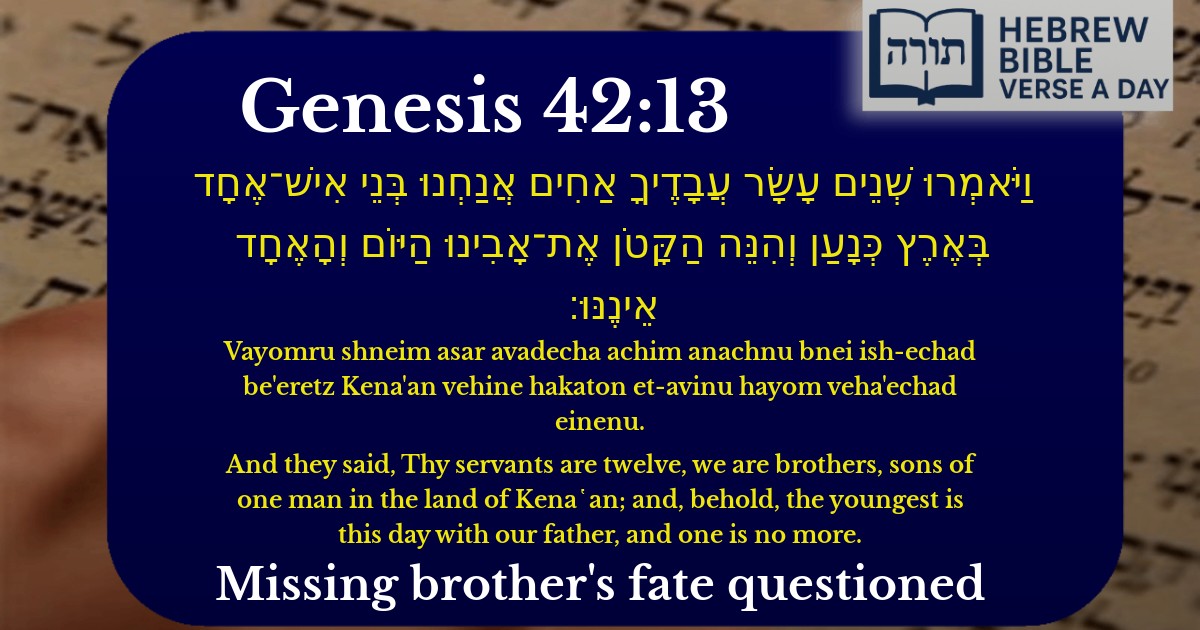Join Our Newsletter To Be Informed When New Videos Are Posted
Join the thousands of fellow Studends who rely on our videos to learn how to read the bible in Hebrew for free!
Hebrew Text
וַיֹּאמְרוּ שְׁנֵים עָשָׂר עֲבָדֶיךָ אַחִים אֲנַחְנוּ בְּנֵי אִישׁ־אֶחָד בְּאֶרֶץ כְּנָעַן וְהִנֵּה הַקָּטֹן אֶת־אָבִינוּ הַיּוֹם וְהָאֶחָד אֵינֶנּוּ׃
English Translation
And they said, Thy servants are twelve, we are brothers, sons of one man in the land of Kena῾an; and, behold, the youngest is this day with our father, and one is no more.
Transliteration
Vayomru shneim asar avadecha achim anachnu bnei ish-echad be'eretz Kena'an vehine hakaton et-avinu hayom veha'echad einenu.
Hebrew Leining Text
וַיֹּאמְר֗וּ שְׁנֵ֣ים עָשָׂר֩ עֲבָדֶ֨יךָ אַחִ֧ים <small>׀</small> אֲנַ֛חְנוּ בְּנֵ֥י אִישׁ־אֶחָ֖ד בְּאֶ֣רֶץ כְּנָ֑עַן וְהִנֵּ֨ה הַקָּטֹ֤ן אֶת־אָבִ֙ינוּ֙ הַיּ֔וֹם וְהָאֶחָ֖ד אֵינֶֽנּוּ׃
וַיֹּאמְר֗וּ שְׁנֵ֣ים עָשָׂר֩ עֲבָדֶ֨יךָ אַחִ֧ים ׀ אֲנַ֛חְנוּ בְּנֵ֥י אִישׁ־אֶחָ֖ד בְּאֶ֣רֶץ כְּנָ֑עַן וְהִנֵּ֨ה הַקָּטֹ֤ן אֶת־אָבִ֙ינוּ֙ הַיּ֔וֹם וְהָאֶחָ֖ד אֵינֶֽנּוּ׃
🎵 Listen to leining
Parasha Commentary
📚 Talmud Citations
This verse is quoted in the Talmud.
📖 Megillah 16b
The verse is referenced in the context of discussing the story of Joseph and his brothers, illustrating the brothers' plea to Joseph before revealing his identity.
📖 Sotah 10b
The verse is cited in a discussion about the righteousness of Jacob's sons and their unity as brothers, despite their earlier conflict with Joseph.


Context of the Verse
This verse (Bereshit 42:13) appears during the encounter between Yosef's brothers and the Egyptian viceroy (Yosef himself, though they do not recognize him). The brothers are responding to Yosef's accusation that they are spies by explaining their family situation. This moment is pivotal in the unfolding drama of Yosef and his brothers.
Rashi's Commentary
Rashi explains that the brothers' statement "we are brothers" refers to their unity—they share a common father and are bound by brotherhood. When they say "the youngest is this day with our father," Rashi notes they were unknowingly fulfilling the prophecy of Yosef's dreams, as they were bowing before him (the "youngest" being Binyamin, who was not present at the sale of Yosef). The phrase "and one is no more" (וְהָאֶחָד אֵינֶנּוּ) refers to Yosef, whom they believed was dead.
Midrashic Insights
Rambam's Perspective
Rambam (Hilchot Teshuvah 2:1) might view this episode as a lesson in hashgacha pratit (divine providence). The brothers' words, though seemingly simple, were part of a larger divine plan to bring about Yosef's rise and the eventual sustenance of Bnei Yisrael in Mitzrayim.
Literary and Thematic Analysis
The phrase "the youngest is this day with our father" underscores Yaakov's favoritism, mirroring the earlier favoritism shown to Yosef. This repetition hints at the recurring theme of sibling rivalry and parental love in Sefer Bereshit. The brothers' mention of their father's grief ("one is no more") also serves as an unconscious admission of guilt, as they were responsible for Yosef's disappearance.